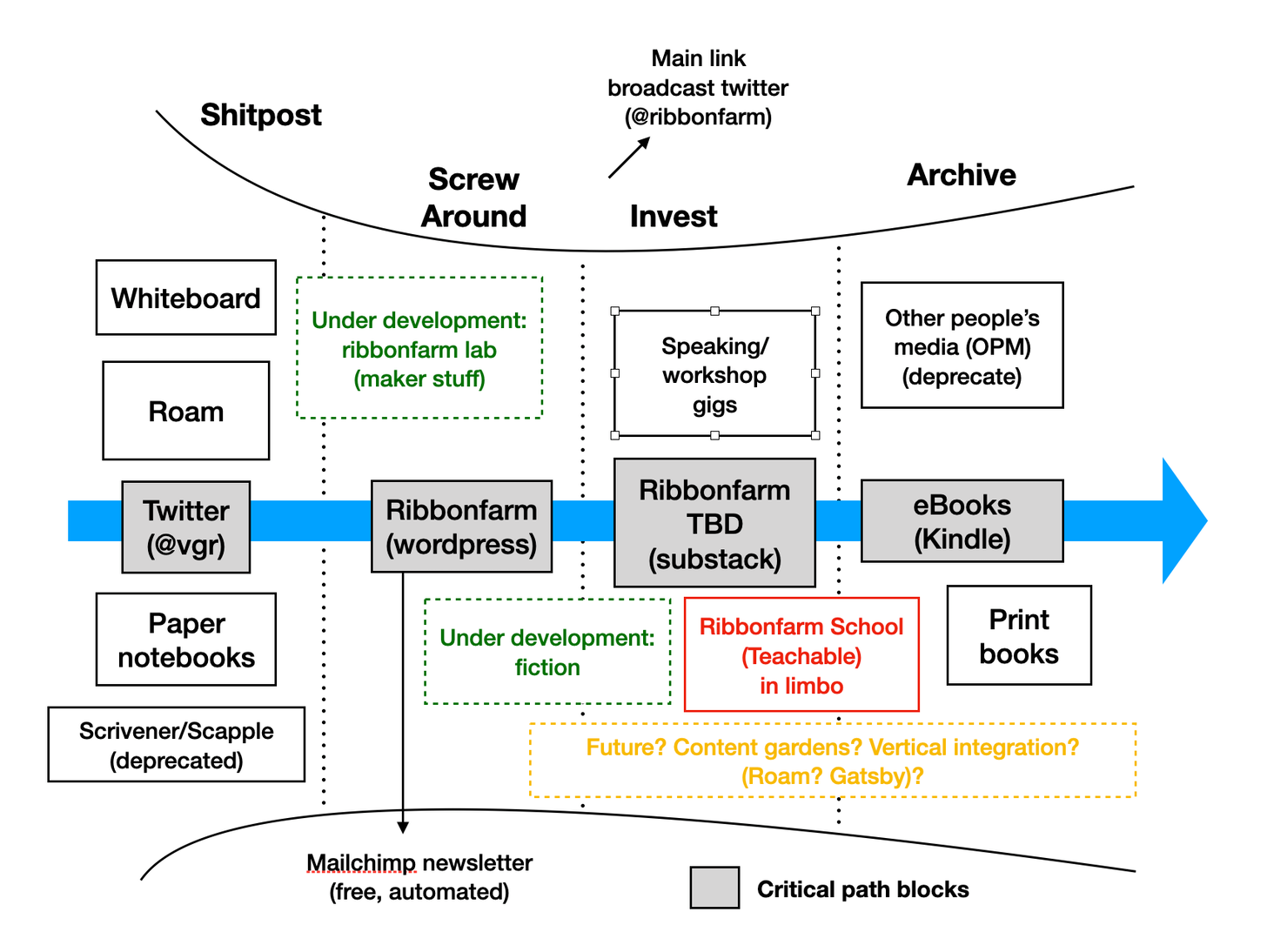People pay selective attention to what they deem important
I really enjoyed this article, ostensibly about the amazing vocal technique of one Charles Kellogg who could “put out fire by singing”. Apparently he could also imitate birdsong perfectly. There’s an interesting video at the end of the article about that.
More interesting to me, however, is the anecdote about what Kellogg’s ear was attuned to, even in a busy urban environment.
Perhaps the most revealing anecdote tells of him walking down the street during a visit to New York, when Kellogg stopped short at the intersection of Broadway and West 34th Street. He turned to his companion and said: “Listen, I hear a cricket.” His friend responded: “Impossible—with all this racket you couldn’t hear a tiny sound like that.” And it was true: cars, trolleys, passersby, shouting newspaper vendors created such a hustle and bustle that no cricket could possibly be discerned in the hubbub.Source: The Man Who Put Out Fires with Music | Culture Notes of an Honest BrokerBut, true to his word, Kellogg scrutinized their busy surroundings, and a moment later crossed the street with his companion following along—and there on a window ledge pointed to a tiny cricket. “What astonishing hearing you have,” his friend marveled. But instead of responding, Kellogg reached into his pocket and pulled out a dime, which he dropped on the sidewalk. The moment the coin hit the pavement it made a small pinging noise, and everybody within 50 feet of the sound stopped and started looking for the coin. People listen for what’s most important for them, he later explained: for New Yorkers it’s the sound of money, for Charles Kellogg it was the chirping of a cricket.
No more simplified URLs in Chrome
On balance, I’m pleased that this ‘experiment’ is being put to rest. Although I’m for simplifying needlessly-complex aspects of the web, my previous work on web literacy would suggest that there’s a certain amount of knowledge and understanding people need to be able to have to read, write, and participate on the web effectively.

At the time, Google said that the reason for running the experiment was that showing full URLs makes it harder for non-technical users to distinguish between legitimate and malicious (phishing) sites, many of which use complicated and long URLs in attempts to confuse users.Source: Google abandons experiment to show simplified domain URLs in Chrome | The RecordShowing only the domain name was considered a good way to remove the extra chaff from a complex URL and only leave the core domain visible in the URL bar.
If users wanted to view the full link, they could click or hover the Chrome address bar to reveal the rest of the page URL.
However, despite its good intentions, the experiment never sat well, with both security experts and end-users alike, who often complained about it when Google silently enabled it on some browsers to gather usage statistics.
A point-based system for email address pronounceability
My personal email address scores 1, my co-op email address (because it ends in .coop) gets a 2.
You're at the doctors office, talking to an aquaintence, or ordering something on the phone and they ask the question: What's your email? Depending on your name, age, and your life choices this can be a breeze or the dreaded question. How long does it take before you have to break out the phonetic alphabet? How many times do you have to repeat it?Source: How Hard is your Email to Say?Today we’re going to come up with a scoring system to measure how painful your email is to tell someone. It’s a golf scoring system with low scores being easy and each point is one unit of struggle for both you and the recipient.
The end of petrol stations
Another article looking at the future of electric vehicles. I particularly like the section where it talks about how, if you were trying to sell the idea of petrol stations these days, you'd never get anyone to sign off the health and safety side of things.

Electric vehicle optimists paint a world where you can plug in anywhere you park - at home while you sleep, as you work, when you are shopping or at the cinema.
Pretty much whatever you are doing, energy will be flowing into your car.
At this point, says Erik Fairbairn, 97% of electric car charging will happen away from petrol pump equivalents.
"Imagine someone came around and filled up your car with petrol every night so you had 300 miles of range every morning," he says. "How often would you need anything else?"
In this brave new world, you'll only ever pull over into a service station on really epic, long journeys when you'll top up your battery for 20-30 minutes while you have a coffee and use the facilities.
Source: Why it's the end of the road for petrol stations | BBC News
A glimpse into the future of autonomous electric vehicles
Ideally, we’d all be using mass transit rather than just switch fossil fuel-based vehicles for their electric equivalents. But, as a student of human nature, I recognise that autonomous electric vehicles might be a pragmatic stop-gap.
This is an interesting article, as it puts a price on how much these vehicles might cost by the hour (~7 Euros) and talks about what people might be doing while waiting for them to recharge (playing video games!)
The German automaker is considering charging an hourly fee for access to autonomous driving features once those features are ready. The company is also exploring a range of subscription features for its electric vehicles, including “range or performance” increases that can be purchased on an hourly or daily basis, said Thomas Ulbrich, a Volkswagen board member, to the German newspaper Die Welt. Ulbrich said the first subscription features will appear in the second quarter of 2022 in vehicles based on Volkswagen’s MEB platform, which underpins the company's new ID.3 compact car and ID.4 crossover.Source: What would you pay for autonomous driving? Volkswagen hopes $8.50 per hour | Ars Technica
Health and sanity before profit
This is an interesting article that takes the tennis player Naomi Osaka’s withdrawal from the French Open as a symptom of wider trends in the workplace.
Many Americans have experienced burnout, and its adjacent phenomenon, languishing, during the pandemic. Unsurprisingly, it has hit women, especially mothers, particularly hard and women’s professional ambition has suffered, according to a survey by CNBC/SurveyMonkey. This trend might be read as a grim step backward in the march toward gender egalitarianism. Or, as in some of the criticism of Ms. Osaka, as an indictment of younger generations’ work ethic. Either interpretation would be misguided.Source: Naomi Osaka and the Cost of Ambition | The New York TimesA better way of putting it: Ms. Osaka has given a public face to a growing, and long overdue, revolt. Like so many other women, the tennis prodigy has recognized that she has the right to put her health and sanity above the unending demands imposed by those who stand to profit from her labors. In doing so, Ms. Osaka exposes a foundational lie in how high-achieving women are taught to view their careers.
In a society that prizes individual achievement above most other things, ambition is often framed as an unambiguous virtue, akin to hard work or tenacity. But the pursuit of power and influence is, to some extent, a vote of confidence in the profit-driven myth of meritocracy that has betrayed millions of American women through the course of the pandemic and before it, to our disillusionment and despair.
Rationalising work for the 40+ brigade
Buried towards the bottom of an update about the Breaking Smart newsletter, Venkatesh Rao includes this diagram and links to a post where he commits to longer-term work.
In an associated Twitter thread, one tweet talks about one way of telling whether a project is a new TLP (‘Top Level Project’) or part of an existing one: does it require a new name or domain name? Interesting.
I’m trying to rationalize all my activities to be simpler and easier to manage. An important first step for me was shutting down my other newsletter, Art of Gig, a month ago. Another was adopting 2 long-term rules across my projects — no new top-level projects, and minimum 10-year commitments.Source: Upcoming Changes | Breaking Smart
Anti-social media
As I mentioned on my blog recently, I sometimes feel a strong pull to ‘nuke’ everything and start over again. With Twitter, I actually did this back in 2017, deleting 77.5k spanning 10 years. They now auto-delete every three months.
This article is based on a survey that BuzzFeed News carried out which revealed a shift in attitude, especially among younger people, to social media. (I think we need a different name for social media that any member of the public can see and those that are private to your followers by default?)
Trying to live in the moment isn’t just difficult because so many of us are prone to documenting our days, our phones and social media apps are also intent on continually resurfacing aspects of our past. While some respondents said they were happy to have the reminders (one mentioned loving comments popping up from her late grandmother — “she was hilarious!”), others had more mixed or flat-out negative feelings.Source: COVID Made People Delete Facebook And Instagram | BuzzFeed NewsSeeing versions of ourselves from 5 or 10 years ago can be cringey, which is why a lot of respondents have purged old posts altogether. Ashlee Burke from Boston, who’s in her late 20s, said she made her old Facebook photo albums private because they’re embarrassing, not because they showed any illegal activity or anything — “unless it’s illegal to be the most embarrassing teenager on the face of the Earth.”
AI-generated misinformation is getting more believable, even by experts
I’ve been using thispersondoesnotexist.com for projects recently and, honestly, I wouldn’t be able to tell that most of the faces it generates every time you hit refresh aren’t real people.
For every positive use of this kind of technology, there are of course negatives. Misinformation and disinformation is everywhere. This example shows how even experts in critical fields such as cybersecurity, public safety, and medicine can be fooled, too.
If you use such social media websites as Facebook and Twitter, you may have come across posts flagged with warnings about misinformation. So far, most misinformation—flagged and unflagged—has been aimed at the general public. Imagine the possibility of misinformation—information that is false or misleading—in scientific and technical fields like cybersecurity, public safety, and medicine.There is growing concern about misinformation spreading in these critical fields as a result of common biases and practices in publishing scientific literature, even in peer-reviewed research papers. As a graduate student and as faculty members doing research in cybersecurity, we studied a new avenue of misinformation in the scientific community. We found that it’s possible for artificial intelligence systems to generate false information in critical fields like medicine and defense that is convincing enough to fool experts.Source: False, AI-generated cybersecurity news was able to fool experts | Fast Company
The end of the Millennial Lifestyle Subsidy
What goes up must come down. In this case with prices of services backed by VC firms, the reverse is true…
Source: Farewell, Millennial Lifestyle Subsidy | The New York TimesFor years, these subsidies allowed us to live Balenciaga lifestyles on Banana Republic budgets. Collectively, we took millions of cheap Uber and Lyft rides, shuttling ourselves around like bourgeois royalty while splitting the bill with those companies’ investors. We plunged MoviePass into bankruptcy by taking advantage of its $9.95-a-month, all-you-can-watch movie ticket deal, and took so many subsidized spin classes that ClassPass was forced to cancel its $99-a-month unlimited plan. We filled graveyards with the carcasses of food delivery start-ups — Maple, Sprig, SpoonRocket, Munchery — just by accepting their offers of underpriced gourmet meals.
These companies’ investors didn’t set out to bankroll our decadence. They were just trying to get traction for their start-ups, all of which needed to attract customers quickly to establish a dominant market position, elbow out competitors and justify their soaring valuations. So they flooded these companies with cash, which often got passed on to users in the form of artificially low prices and generous incentives.
Now, users are noticing that for the first time — whether because of disappearing subsidies or merely an end-of-pandemic demand surge — their luxury habits actually carry luxury price tags.
Briar now does pictures
Briar isn’t the kind of app you necessarily use every day and, in fact, it positions itself as a something used by activists. That being said, it’s really useful that there’s now the ability to send images to other users.
I’ve tested the feature (which requires both parties to be on v1.3) and it works well.
The Briar Project released version 1.3 of its Android app today. Thanks to support from eQualit.ie, this release adds several new features that have been requested by many users over the years.With today’s release, users can upload profile pictures that will be visible only to their contacts.Lots of people have asked for a way to send images via Briar. We listened! This release adds the ability to send images in private conversations. Images are still heavily compressed, so high resolution images might show pixel artifacts.Source: Briar 1.3 released
Who's the pet? Tarantula or tiny frog?
I read recently that some tarantulas keep tiny frogs as ‘pets’. Of course, I had to do some more digging and found out that’s not quite true, and if it were, it would be more like the other way around (as some tarantulas are so docile!)
I’ve seen some “sources” (and I really do use the word source here in it’s least possible capacity) try to say that the frogs eat potential nuisances to the spider like ants, mites and other nasties which is why the spider keeps it around. This is silly for a few reasons. 1. Tarantulas line the entire length of their burrow (which can be several feet deep) with thick sticky web. This prevents things like small insects from burrowing into or walking into their homes. Anything large enough to do so is too big to be eaten by the frog. 2. These frogs don’t even eat stuff like mites or springtails. The prey items are far too small for them to bother with. 3. If there are enough ants to bother a tarantula of this size the frog is going to die if it sticks around anyway.Source: Is it true that some tarantulas keep tiny frogs as pets? - Quora
More US electoral chaos to come in 2024?
Difficult to argue against this scenario.
The scenario then goes like this. The Republicans win back the House and Senate in 2022, in part thanks to voter suppression. The Republican candidate in 2024 loses the popular vote by several million and the electoral vote by the margin of a few states. State legislatures, claiming fraud, alter the electoral count vote. The House and Senate accept that altered count. The losing candidate becomes the president. We no longer have “democratically elected government.” And people are angry.Source: The Last Free Election in America | Kottke
Epistemological chaos and denialism
Good stuff from Cory Doctorow on how Big Tobacco invented the playbook and it’s been refined in other industries (especially online) ever since.
Denial thrives on epistemological chaos: a denialist doesn’t want to convince you that smoking is safe, they just want to convince that it’s impossible to say whether smoking is safe or not. Denial weaponizes ideas like “balance,” demanding that “both sides” of every issue be presented so the public can decide. Don’t get me wrong, I’m as big a believer in dialetical materialism as you are likely to find, but I also know that keeping an open mind doesn’t require that you open so wide that your brains fall out.Source: I quit. | Cory Doctorow | MediumThe bad-faith “balance” game is used by fraudsters and crooks to sow doubt. It’s how homeopaths, anti-vaxers, eugenicists, raw milk pushers and other members of the Paltrow-Industrial Complex played the BBC and other sober-sided media outlets, demanding that they be given airtime to rebut scientists’ careful, empirical claims with junk they made up on the spot.
This is not a harmless pastime. The pandemic revealed the high price of epistemological chaos, of replacing informed debate with cynical doubt. Argue with an anti-vaxer and you’ll soon realize that you don’t merely disagree on what’s true — you disagree on whether there is such a thing as truth, and, if there is, how it can be known.
Information cannot be transmitted faster than the [vacuum] speed of light
It’s been a while since I studied Physics, so I confess to not exactly understanding what’s going on here. However, if it speeds up my internet connection at some point in the future, it’s all good.
"Our experiment shows that the generally held misconception that nothing can move faster than the speed of light, is wrong. Einstein's Theory of Relativity still stands, however, because it is still correct to say that information cannot be transmitted faster than the vacuum speed of light," said Dr. Lijun Wang. "We will continue to study the nature of light and hopefully it will provide us with a better insight about the natural world and further stimulate new thinking towards peaceful applications that will benefit all humanity."Source: Laser pulse travels 300 times faster than light
You don't have to monetize your joy
A useful reminder.
Adam J. Kurtz, author of Things Are What You Make of Them has rewritten the maxim for modern creatives: “Do what you love and you’ll never work a day in your life work super fucking hard all the time with no separation or any boundaries and also take everything extremely personally.” Which, aside from being relatable to anyone who has tried to make money from something they truly care about, speaks to an underrepresented truth: those with passion careers can have just as much career anxiety as those who clock in and out of the mindless daily grind.Source: The Modern Trap of Feeling Obligated to Turn Hobbies Into Hustles | repeller[…]
How did we get to the point where free time is so full of things we have to do that there’s no room for things we get to do? When did a beautiful handmade dress become a reminder of one’s inadequacies? Would the world really fall apart if, when I came home from a long day of work, instead of trying to figure out what I could conquer, I sat down and, I don’t know, tried my hand at watercolors? What if I sucked? What if it didn’t matter? What if that’s not the point?
Peer review sucks
I don’t have much experience of peer review (I’ve only ever submitted one article and peer reviewed two) but it felt a bit archaic at the time. From what I hear from others, they feel the same.
The interesting thing from my perspective is that the whole edifice of the university system is slowly crumbling. Academics know that the system is ridiculous.
This then is why I was so bothered about how Covid-19 research is reported: peer review is no guard, is no gold standard, has little role beyond gate-keeping. It is noisy, biased, fickle. So pointing out that some piece of research has not been peer reviewed is meaningless: peer review has played no role in deciding what research was meaningful in the deep history of science; and played little role in deciding what research was meaningful in the ongoing story of Covid-19. The mere fact that news stories were written about the research decided it was meaningful: because it needed to be done. Viral genomes needed sequencing; vaccines needed developing; epidemiological models needed simulating. The reporting of Covid-19 research has shown us just how badly peer review needs peer reviewing. But, hey, you’ll have to take my word for it because, sorry, this essay is (not yet peer reviewed).Source: The Absurdity of Peer Review | Elemental
How to recover from burnout
The World Health Organisation (WHO) defines occupational burnout as "feelings of energy depletion or exhaustion; increased mental distance from one’s job, or feelings of negativism or cynicism related to one's job; and reduced professional efficacy."
Based on that definition, I've experienced burnout twice, once in my twenties and once in my thirties. But what to do about it? And how can we prevent it?
I read a lot of Hacker News, including some of the 'Ask HN' threads. This one soliciting advice about burnout received what I considered to be a great response from one user.
Around August last year I just couldn't continue. I wasn't sleeping, I was frequently run down, and I was self-medicating more and more with drugs and alcohol. It eventually got to the point where simply opening my laptop would elicit a fight or flight response.
I was lucky enough to be in a secure enough financial situation to largely take 6 months off. If you're in a position to do this, I highly recommend it.
I uninstalled gmail, slack, etc. from my phone. I considered getting a dumb phone, but settled for turning off push notifications for everything instead. I went away with my girlfriend for a week and left all my tech at home except for my kindle (literally the first time I've been disconnected for more than a couple of days in probably 20 years). I exercised as much as possible and spent time in nature going for walks, etc.
I've been back at it part time for the last few months. Gradually I felt the feelings of burnout being replaced with feelings of boredom, which is hopefully my brain's way of saying that it's starting to repair itself and ready to slowly return to work.
I'm still nowhere near back to peak productivity, but I'm starting to come to terms with the fact that I may never get back there. I'm 36 and probably would have dropped dead of overwork by 50 if I kept up the tempo of the last 10 years anyway.
I'm not 'cured' by any means, but I believe things are slowly getting better.
My advice to you is to be kind and patient with yourself. Try not to stress about not having a side-project, and instead just focus on self-care for a while. Someone posted this on HN a few weeks back and it really hit close to home for me: http://www.robinhobb.com/blog/posts/38429
Portals to another world (or town)
I love this idea. I can think of many ways it could go wrong, but that’s not the point. There’s also lots of ways it could be awesome.
Vilnius, Lithuania, has installed a “portal” that allows residents to make contact in real time with the inhabitants of Lublin, Poland. Each city hosts a large circular screen and cameras by which residents can interact in real time via the Internet.Source: Neighbors - Futility Closet
How to organise your fridge
My wife, who is one of the most organised people I know, is nevertheless what I would term a ‘fridge anarchist’. I like order, she puts anything anywhere. Lifehacker agrees with my way of doing things.
Store snacks, leftovers, and other items that get consumed quickly (that could also go bad quickly) on the top shelf. The middle shelves are for dairy, cheeses, cooked meats, and leftovers. The midsection tends to be on the cooler end, so store your milk and eggs here, and they’ll keep longer. If your milk doesn’t fit in the middle section, you can easily rearrange the shelving to accommodate your needs. Items that contain bacteria need to be kept separate to avoid cross-contamination—store these items on the last shelf. The bottom shelf is perfect for raw meat and fish, and should be wrapped or stored in sealed containers. The drawers are for your fruits and vegetables. (Though they can be too moist for mushrooms.)Source: Organize Your Fridge Like You're a Goddamned Adult | Lifehacker












